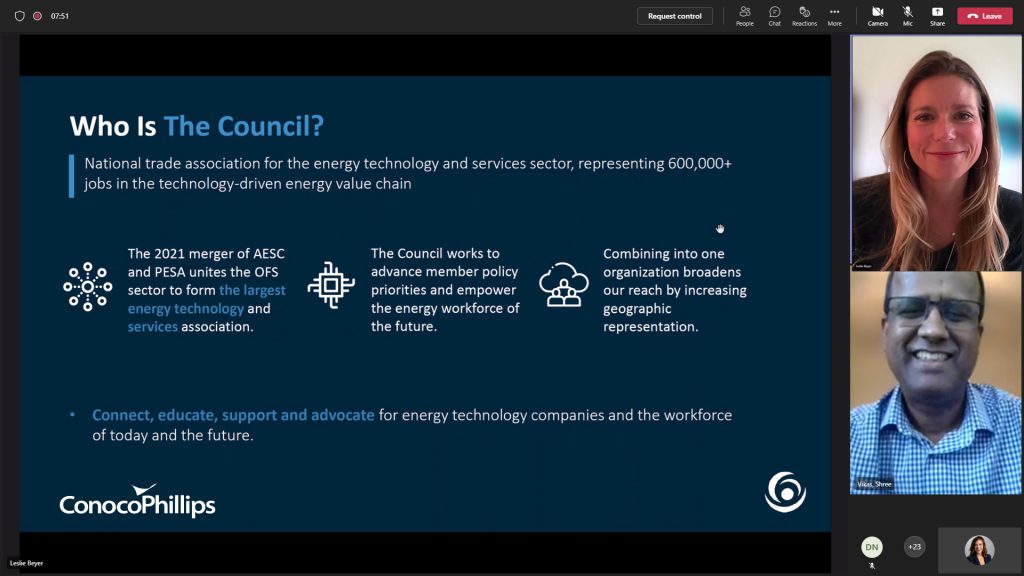Last week, Energy Workforce and Technology Council CEO Leslie Beyer spoke to employees at ConocoPhillips as part of their “Market Insight Series.” In her remarks, Beyer discussed the increasing supply chain challenges facing the industry, workforce challenges and technologies the industry is implementing.
“COVID and Russia’s invasion of Ukraine are negatively impacting ports and transportation routes around the world, leading to shortages in supply, longer shipping times and overall increased costs in the supply chain,” Beyer said.
“Over the next six to 12 months, we will need an ‘all of the above’ strategy as it pertains to suppliers. The industry will need to look at non-traditional sources, build strong relationships with suppliers and plan for risks and unforeseen blockades to the supply chain.”
Leslie Beyer, CEO, Energy Workforce & Technology Council
Attendees at the event agreed that building long-term relationships with suppliers is vital, especially when faced with lingering challenges over the supply chain.
Contributing to supply chain shortages and higher costs include shippers avoiding ports in Russia and Ukraine, the overland rail link between China and Europe in danger of being cancelled as it passes through Russia and Belarus, and COVID lockdowns in China that are causing port closures as well as causing backlogs in other ports, particularly in Singapore. While India and Brazil are looking to fill the gap, they are also being stretched and can’t immediately fill the growing demand.
Steel sourcing was of particular interest as Russia and Ukraine are top producers of pig iron used in steel, contributing two-thirds of the U.S. imports. In addition to looking at India, Brazil and Asia to help close the gap in lost imports, companies are looking to alternatives in the production of steel, including domestic and other North American resources.
Talent is also a critical issue facing the industry. As employers continue to hire, the industry labor market is still well below pre-pandemic numbers. Additionally, industry reputation has taken a hit, and recruiting and retaining new talent to the energy sector continues to be a challenge.
“The public perception of our industry’s volatility and environmental impacts have been compounded by the current Administration’s narrative that have led to challenges in not only recruiting talent but retaining it. In order to recruit the people who will develop the lower carbon technologies, our industry must adopt and create a diverse, inclusive and equitable culture. The workforce of the future wants to work at companies where DEI is a priority.”
Leslie Beyer, Energy Workforce & Technology Council
The industry, while still needing to improve diversity, is making strides in the right direction. Prior to the pandemic, women in the energy services and technology sector made up 16% of the workforce. Data from the 2021 Inclusion and Diversity Survey, found that female participation in the workforce actually grew to 19%.
Beyer outlined three types of action the industry will take that will set the pace and success of energy transition.
“First, we need to clean the core: doing what we do, better with less emissions and smaller footprints. Next, we accelerate the transition by using natural gas as a transition fuel and zero emission sources of fuel where possible. Finally, we extend the frontier, scaling solutions to commercialization that is beyond what is feasible today,” Beyer said.
She also highlighted several innovative technologies and business practices, including where the sector is investing capital expenditures, and where the industry is leading on within energy transition. These technologies include carbon capture sequestration, methane leak detection, battery storage technology, geothermal energy, total fleet electrification, dynamic gas blending, complete system automation, hydrogen technologies and offshore remote operations, in addition to digital technologies.
“Leveraging their long history of finding and deploying technological solutions on a global scale, our Member Companies are making energy cleaner, safer and more cost-effective than ever before.”
Leslie Beyer, Energy Workforce & Technology Council
Corry Schiermeyer, Senior Director Communications, writes about governmental policies for the Energy Workforce & Technology Council. Click here to subscribe to the Energy Workforce newsletter, which highlights sector-specific issues, best practices, activities and more.





